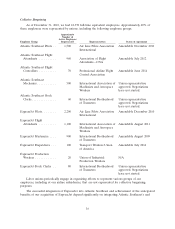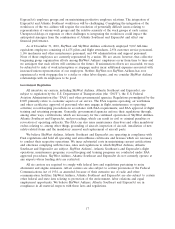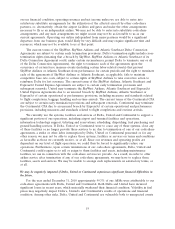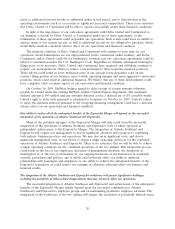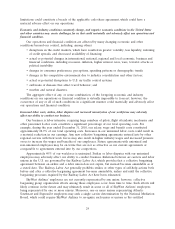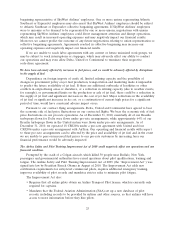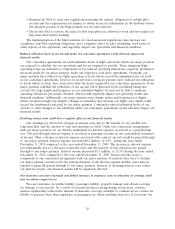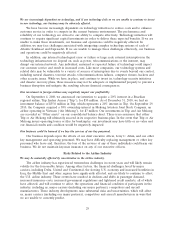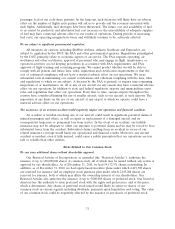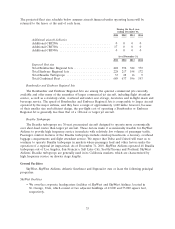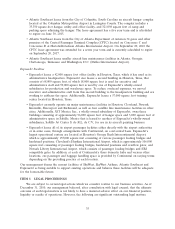SkyWest Airlines 2010 Annual Report Download - page 29
Download and view the complete annual report
Please find page 29 of the 2010 SkyWest Airlines annual report below. You can navigate through the pages in the report by either clicking on the pages listed below, or by using the keyword search tool below to find specific information within the annual report.bargaining representative of SkyWest Airlines’ employees. One or more unions representing Atlantic
Southeast or ExpressJet employees may also assert that SkyWest Airlines’ employees should be subject
to Atlantic Southeast or ExpressJet collective bargaining agreements. If SkyWest Airlines’ employees
were to unionize or be deemed to be represented by one or more unions, negotiations with unions
representing SkyWest Airlines’ employees could divert management attention and disrupt operations,
which may result in increased operating expenses and may negatively impact our financial results.
Moreover, we cannot predict the outcome of any future negotiations relating to union representation or
collective bargaining agreements. Agreements reached in collective bargaining may increase our
operating expenses and negatively impact our financial results.
If we are unable to reach labor agreements with any current or future unionized work groups, we
may be subject to work interruptions or stoppages, which may adversely affect our ability to conduct
our operations and may even allow Delta, United or Continental to terminate their respective
code-share agreement.
We have been adversely affected by increases in fuel prices, and we would be adversely affected by disruptions
in the supply of fuel.
Dependence on foreign imports of crude oil, limited refining capacity and the possibility of
changes in government policy on jet fuel production, transportation and marketing make it impossible
to predict the future availability of jet fuel. If there are additional outbreaks of hostilities or other
conflicts in oil-producing areas or elsewhere, or a reduction in refining capacity (due to weather events,
for example), or governmental limits on the production or sale of jet fuel, there could be a reduction in
the supply of jet fuel and significant increases in the cost of jet fuel. Major reductions in the availability
of jet fuel or significant increases in its cost, or a continuation of current high prices for a significant
period of time, would have a material adverse impact on us.
Pursuant to our contract flying arrangements, Delta, United and Continental have agreed to bear
the economic risk of fuel price fluctuations on our contracted flights. We bear the economic risk of fuel
price fluctuations on our pro-rate operations. As of December 31, 2010, essentially all of our Brasilia
turboprops flown for Delta were flown under pro-rate arrangements, while approximately 64% of our
Brasilia turboprops flown in the United system were flown under pro-rate arrangements. As of
December 31, 2010, we operated 18 CRJ200s under a pro-rate agreement with United and four
CRJ200s under a pro-rate arrangement with AirTran. Our operating and financial results with respect
to these pro-rate arrangements can be affected by the price and availability of jet fuel and in the event
we are unable to pass on increased fuel prices to our pro-rate customers by increasing fares our
financial performance would be adversely impacted.
The Airline Safety and Pilot Training Improvement Act of 2009 could negatively affect our operations and our
financial condition.
Prompted by the crash of a Colgan aircraft, which killed 50 people near Buffalo, New York,
passengers and governmental authorities have raised questions about pilot qualifications, training and
fatigue. The Airline Safety and Pilot Training Improvement Act of 2009 (the ‘‘Improvement Act’’) was
signed into law by President Barack Obama in August of 2010. The Improvement Act adds new
certification requirements for entry-level commercial pilots, requires additional emergency training,
improves availability of pilot records and mandates stricter rules to minimize pilot fatigue.
The Improvement Act also:
• Requires that all airline pilots obtain an Airline Transport Pilot license, which is currently only
required for captains.
• Mandates that the Federal Aviation Administration (FAA) set up a new database of pilot
records, including records to be provided by airlines and other sources, so that airlines will have
access to more information before they hire pilots.
25



